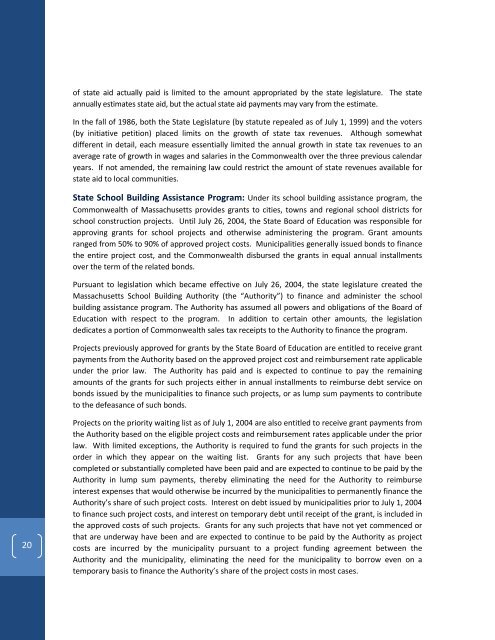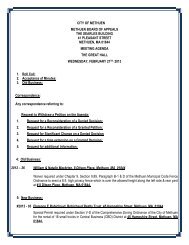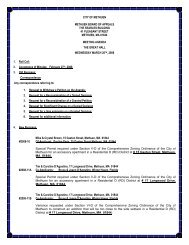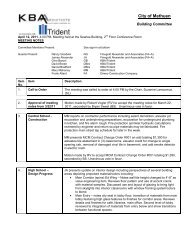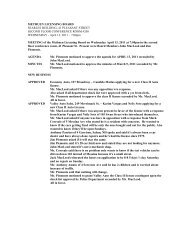City of Methuen Annual Report: 2012
City of Methuen Annual Report: 2012
City of Methuen Annual Report: 2012
You also want an ePaper? Increase the reach of your titles
YUMPU automatically turns print PDFs into web optimized ePapers that Google loves.
C i t y o f M e t h u e n A n n u a l R e p o r t : 2 0 1 2<strong>of</strong> state aid actually paid is limited to the amount appropriated by the state legislature. The stateannually estimates state aid, but the actual state aid payments may vary from the estimate.In the fall <strong>of</strong> 1986, both the State Legislature (by statute repealed as <strong>of</strong> July 1, 1999) and the voters(by initiative petition) placed limits on the growth <strong>of</strong> state tax revenues. Although somewhatdifferent in detail, each measure essentially limited the annual growth in state tax revenues to anaverage rate <strong>of</strong> growth in wages and salaries in the Commonwealth over the three previous calendaryears. If not amended, the remaining law could restrict the amount <strong>of</strong> state revenues available forstate aid to local communities.State School Building Assistance Program: Under its school building assistance program, theCommonwealth <strong>of</strong> Massachusetts provides grants to cities, towns and regional school districts forschool construction projects. Until July 26, 2004, the State Board <strong>of</strong> Education was responsible forapproving grants for school projects and otherwise administering the program. Grant amountsranged from 50% to 90% <strong>of</strong> approved project costs. Municipalities generally issued bonds to financethe entire project cost, and the Commonwealth disbursed the grants in equal annual installmentsover the term <strong>of</strong> the related bonds.Pursuant to legislation which became effective on July 26, 2004, the state legislature created theMassachusetts School Building Authority (the “Authority”) to finance and administer the schoolbuilding assistance program. The Authority has assumed all powers and obligations <strong>of</strong> the Board <strong>of</strong>Education with respect to the program. In addition to certain other amounts, the legislationdedicates a portion <strong>of</strong> Commonwealth sales tax receipts to the Authority to finance the program.Projects previously approved for grants by the State Board <strong>of</strong> Education are entitled to receive grantpayments from the Authority based on the approved project cost and reimbursement rate applicableunder the prior law. The Authority has paid and is expected to continue to pay the remainingamounts <strong>of</strong> the grants for such projects either in annual installments to reimburse debt service onbonds issued by the municipalities to finance such projects, or as lump sum payments to contributeto the defeasance <strong>of</strong> such bonds.20Projects on the priority waiting list as <strong>of</strong> July 1, 2004 are also entitled to receive grant payments fromthe Authority based on the eligible project costs and reimbursement rates applicable under the priorlaw. With limited exceptions, the Authority is required to fund the grants for such projects in theorder in which they appear on the waiting list. Grants for any such projects that have beencompleted or substantially completed have been paid and are expected to continue to be paid by theAuthority in lump sum payments, thereby eliminating the need for the Authority to reimburseinterest expenses that would otherwise be incurred by the municipalities to permanently finance theAuthority’s share <strong>of</strong> such project costs. Interest on debt issued by municipalities prior to July 1, 2004to finance such project costs, and interest on temporary debt until receipt <strong>of</strong> the grant, is included inthe approved costs <strong>of</strong> such projects. Grants for any such projects that have not yet commenced orthat are underway have been and are expected to continue to be paid by the Authority as projectcosts are incurred by the municipality pursuant to a project funding agreement between theAuthority and the municipality, eliminating the need for the municipality to borrow even on atemporary basis to finance the Authority’s share <strong>of</strong> the project costs in most cases.


